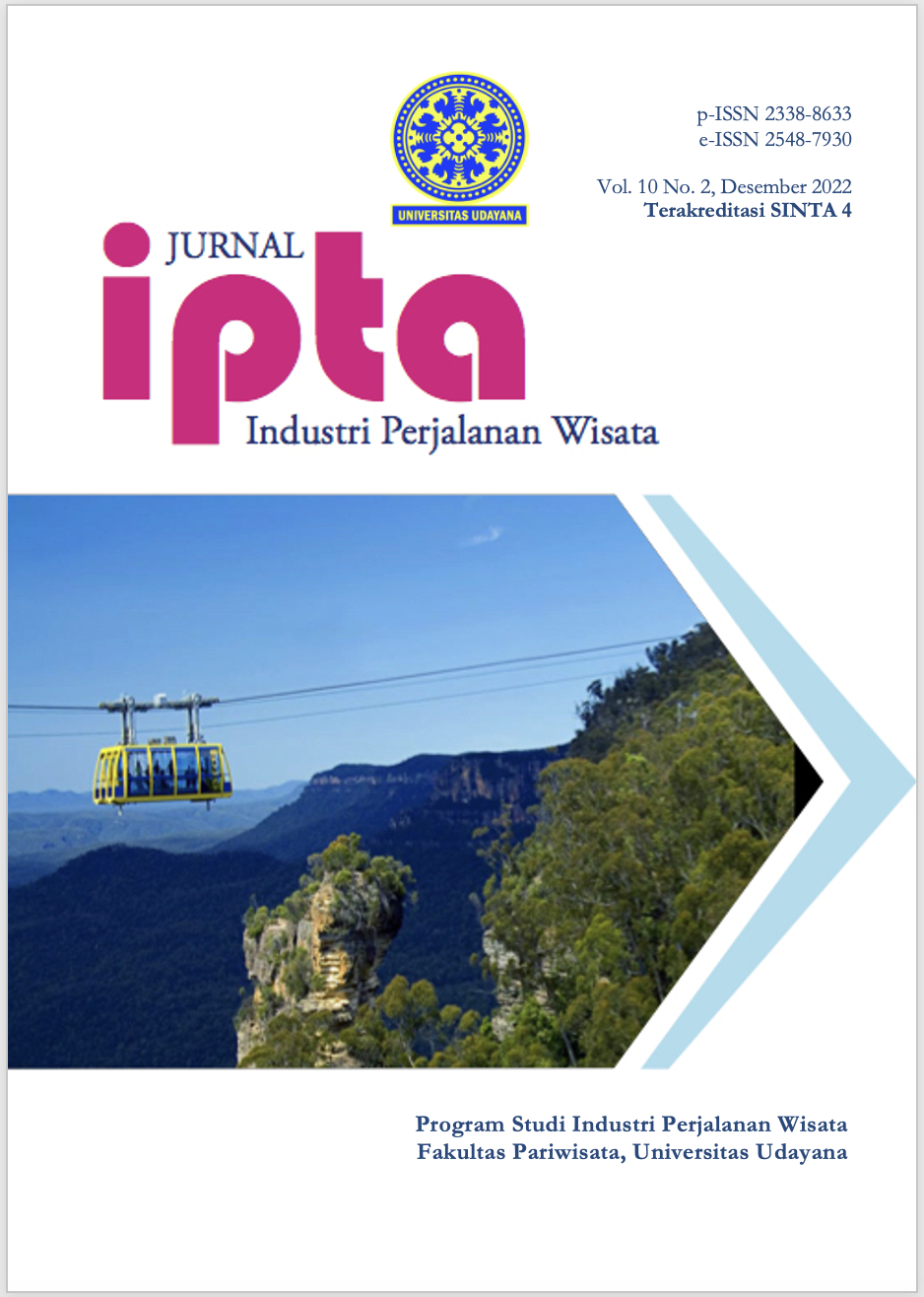STRATEGI PENGEMBANGAN DESA WISATA BERBASIS MASYARAKAT DI DESA CAU BELAYU, TABANAN
Abstract
This research is conducted because the development of tourism in Tabanan Regency is monotonous in its popular tourist attraction and there is no innovation to collaborate between the natural, cultural, and creative potential of the local community. One of the innovation breakthrough that needs to be done is the development of Community-Based Tourism Village in Cau Belayu Village, Marga District, Tabanan Regency. This study aims to formulate strategy model and program for the development of Community-Based Tourism Village in Cau Belayu Village, Marga District, Tabanan Regency. This study results indicate several strategies that can be applied: developing a variety of rural tourism products based on the uniqueness of the local potential, creating a brand image of tourist destinations, increasing marketing activities for rural tourism products, improving traditional village based security systems, increasing tourism industry product certification, implementing CHSE strict regulations in every presentation of rural tourism products and activities, strategies for strengthening the entrepreneurial spirit of the Cau Belayu Village community, strategies for building marketing networks with tourism stakeholders, creating smooth and beautiful accessibility to tourist attractions, building tourism institutional governance, creating beautiful environment in the area around tourist attractions, increasing the competence of human resources in the field of tourism, increasing public awareness of tourism awareness and Sapta Pesona.
Downloads
References
David, Fred R. 2004. Manajemen Strategis. Jakarta: PT Intan Sejati Klaten.
Fandeli, C. 2002. Perencanaan Kepariwisataan Alam. Yogyakarta: Fakultas Kehutanan UGM.
Fannel, D. 1999. Ecotourism: An Introduction. London: Routledge.
Gunawan, Myra P.1997. Pariwisata Indonesia: Berbagai Aspek dan Gagasan Pembangunan. Bandung: Pusat Penelitian Lembaga Penelitian Institut Teknologi Bandung.
Goodwin, H. 1998. Sustainable Tourism and Property Elimination. Paper on workshop on Sustainable Tourism and Property. United Kingdom.
Ismaningrum, Tiwik. 2005. Analisis Pariwisata Massa dan Pariwisata Minat Khusus di Kabupaten Buleleng. Tesis Kajian Pariwisata Universitas Udayana.
Inskeep,1995. Tourism Planning and Integrated and Sustainable Development Approach.
Kodhyat, H dan Sugiarto, Endar. 1992. Kamus Pariwisata dan Perhotelan. Jakarta: PT. Gramedia Widya Sarana.
Kodhyat, H. 1997. Hakekat dan Perkembangan Wisata Alternatif. Bandung : ITB.
Kusmayadi dan Sugiarto. 2002. Metodelogi Penelitian di Bidang Kepariwisataan. Jakarta: PT Gramedia Pustaka Utama.
Pitana I Gde dan Gayatri Putu G. 2005. Sosiologi Pariwisata. Yogyakarta: Andi Offset.
Pitana, I Gde. 2006. Kepariwisataan Bali dalam Wacana Otonomi daerah. Jakarta: Puslitbang Kepariwisataan.
Pitana, I Gde 2004. Mispersepsi Pemberdayaan Masyarakat dalam Kepariwisaaan Bali. Bali Post, Maret 2004. Hal 7.
Nuryanti, Wiendu. 1993. Concept, Perspective and Challenges, makalah bagian dari Laporan Konferensi Internasional mengenai Pariwisata Budaya. Yogyakarta: Gadjah Mada University Press. Hal. 2-3).
Nasir.1988. Metode Penelitian. Ghalia Indonesia Jakarta.
Rangkuti, Freddy. 2004. Analisis SWOT Teknik Membedah Kasus Bisnis. Jakarta: PT Gramedia Pustaka Utama.
Soetarso Priasukmana dan R. Mohamad Mulyadin,2001. Pembangunan Desa Wisata: Pelaksanaan Undang-Undang Otonomi Daerah. Info Sosial Ekonomi Vol 2 No 1
Umar, H. 2003. Strategic Management in Action. Jakarta: PT. Gramedia Pustaka Utama.
Undang-Undang Nomor 10 Tahun 2009 Tentang Kepariwisataan.
Putra, 2008. Eksotisme Sebagai Modal Dasar Pengembangan Desa Wisata. Diunduh dari http://tourism.padang.go.id/index.php?tourism=news&id=5.

This work is licensed under a Creative Commons Attribution-ShareAlike 4.0 International License.





